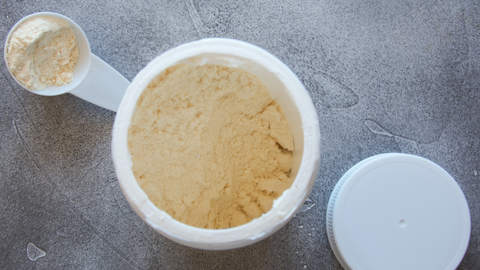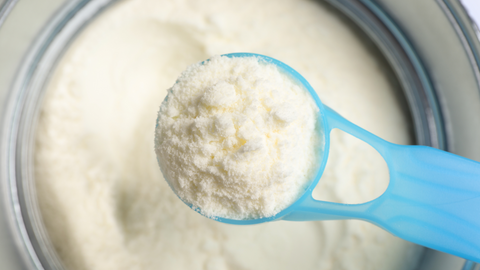Bovine Colostrum for Kids: A Nutritional Powerhouse for Early Development
April 19, 2024
Making sure that infants and children receive proper nutrition is essential for their health and development, especially for those who are not breastfeeding. Among the many nutritional supplements available for children, bovine colostrum stands out as a unique and powerful resource, offering a spectrum of health benefits that closely mirror those of human colostrum. Bovine colostrum has a rich nutritional profile and contains essential nutrients and immune-boosting properties. This article explores what bovine colostrum is and examines its benefits for infants and children, as well as its safety and scientific research to support its benefits.
What is Bovine Colostrum?

Bovine colostrum is the first form of milk produced by cows immediately following the birth of a calf. This early milk is highly concentrated with antibodies, growth factors, and nutrients designed to support the newborn calf's immune system and growth. (1) Structurally and compositionally, bovine colostrum is similar to human colostrum but comes from cows. It contains high levels of proteins, carbohydrates, fats, vitamins, minerals, and immunoglobulins—specifically IgA, IgG, and IgM—which are essential for disease resistance. (1)
Benefits of Colostrum for Babies

Bovine colostrum offers benefits for adults and children. However, it is particularly beneficial for infants, especially those who are not breastfeeding. Some of the benefits of colostrum for babies include:
Immune Support for Non-Breastfed Infants
The primary advantage of colostrum for infants lies in its unique ability to boost the immune system. Human breastmilk also contains colostrum, providing infants with essential immunoglobulins that support their disease resistance and set the foundation of their immune health. For babies who are not breastfed and thus do not receive maternal colostrum, bovine colostrum serves as a potent alternative. Its high concentration of antibodies and immunoglobulins can mimic the immune-protective qualities of human colostrum, providing an additional defense against pathogens. (2)
Gastrointestinal Development
Bovine colostrum is rich in growth factors, such as insulin-like growth factors (IGF) and transforming growth factors (TGF), which aid in the development of a healthy gut lining. This can be crucial for infants, promoting better nutrient absorption and reducing the risk of developing conditions like necrotizing enterocolitis (NEC) in premature infants. (3)
Prevention of Infections
Infants are particularly susceptible to infections. The antimicrobial properties of bovine colostrum can play an important role in reducing the incidence of infections in early life, such as diarrheal diseases and upper respiratory infections. (3)
Benefits of Colostrum for Children

In addition to being beneficial for infants, colostrum also has unique benefits for children:
Nutritional Supplementation
Older children can benefit from the high nutritional content of bovine colostrum, which includes proteins, vitamins, and minerals essential for growth and development, complementing their diversifying diet. (3)
Enhanced Recovery
For children that are involved in sports or physical activities, the growth factors in colostrummayhelp with muscle recovery and repair, as well as potentially improving gut health, which is linked to overall wellness and immunity.
Support for Autoimmune Conditions
Some research suggests that bovine colostrum may have beneficial effects for children with autoimmune conditions by modulating immune responses and reducing inflammation, though more research is needed in this area. (4)
Allergy Management
There is some evidence to suggest that colostrum can help manage allergies due to the presence of proline-rich polypeptides (PRPs), which may help regulate the immune system's response to allergens. (5)
Can You Add Colostrum to Baby Formula?

Yes, it is possible to add bovine colostrum to infant formula to enhance its nutritional profile. For infants, especially those who are premature or have a compromised immune system, colostrum can be a valuable addition under the guidance of a healthcare professional.
Safety and Dosage
When it comes to giving anything to infants or children, it is crucial to make sure that it is safe and does not cause harmful side effects. Bovine colostrum is generally considered to be a very safe supplement for most children. However, it is essential to approach supplementation under medical guidance, particularly concerning dosage and preparation. Pediatricians can provide guidance based on the specific health needs and conditions of the child.
Colostrum for Kids with Allergies or Lactose Intolerance
A potential concern is the suitability of bovine colostrum for children with cow's milk protein allergies or lactose intolerance. While colostrum contains less lactose than regular milk, it can still pose risks for lactose-intolerant individuals. Moreover, the proteins in colostrum can trigger reactions in children with milk protein allergies. Clinical advice from your pediatrician is crucial in these cases to avoid any adverse reactions.
Scientific Evidence Supporting Colostrum for Kids
The efficacy of colostrum in enhancing child health is backed by numerous studies. For instance, a meta-analysis highlighted that colostrum supplementation could significantly reduce the incidence of infection in children under the age of 12 months. (6) Another study demonstrated that premature infants fed with colostrum experienced better growth outcomes compared to those who did not receive it. (7) While more scientific research is needed to understand the full effects of colostrum on babies and children, current research highlights many potential health benefits.
Summary
Bovine colostrum offers numerous potential health benefits for babies, especially those who are not breastfed. It stands out as a valuable supplement to support immune function, gastrointestinal health, and overall nutritional status. However, the use of colostrum for infants and children should be approached under the guidance of a medical professional, particularly concerning allergies and lactose sensitivity. Parents and caregivers should consult healthcare providers to tailor colostrum supplementation to their child's specific needs, ensuring safety and efficacy.
Colostrum for kids, whether as a direct supplement or added to formula, provides a promising avenue for enhancing the health and development of children from infancy through to the early years of life.
References
1 https://www.ncbi.nlm.nih.gov/pmc/articles/PMC8255475/
2 https://www.ncbi.nlm.nih.gov/pmc/articles/PMC7831509/
3 https://www.ncbi.nlm.nih.gov/pmc/articles/PMC8402036/
4 https://www.ncbi.nlm.nih.gov/pmc/articles/PMC8624701/
5 https://www.ncbi.nlm.nih.gov/pmc/articles/PMC10574092/
True Health Starts with Feeding the Body

